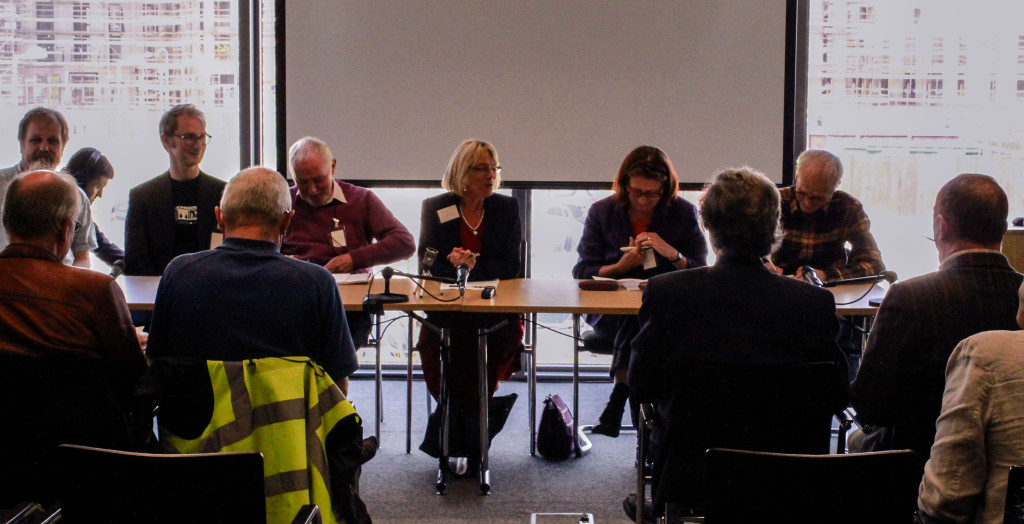Sally O’Neill, who worked for 37 years in Latin America for Trócaire, the Irish Catholic international development agency, died following an April 8, 2019 car accident in Guatemala.
We were both shocked and saddened to learn of the death of our former colleague Sally O’Neill Sanchez in a car accident in Guatemala. We offer our sincere sympathies to Sally’s family especially her children Roger, Rhona and Xio, and her husband, Roger. Anyone who knew her, and especially those of us who worked directly with her will appreciate what a significant loss to the cause of world human development, her death represents.
More importantly, we also recognise what her life meant and what her work contributed to that agenda. Sally was ever a formidable woman and a passionate advocate of justice and human rights. She was the last surviving member of the triumvirate that moulded and shaped that unique Irish institution, Trócaire – the other two being Brian McKeown and Bishop Eamonn Casey. She was, as has been recognised, a key rhythm in the heartbeat of Trócaire. With her death, a formative chapter in the history of, not just Trócaire but also Ireland’s journey in international development struggles, closes.
For both of us, Sally represented much that characterised and energised the international development NGO story in Ireland in its infancy. In her own inimitable style, she was relentless in challenging structures and agendas that negatively impacted on the world’s poor and vulnerable whether in politics, government, society at large or in the church itself. Her character and demeanour mixed with very considerable experience ‘in the field’ combined to make her a force to be reckoned with.
Along with her many colleagues in Trócaire, Sally highlighted the importance of advocating for practical humanitarian assistance and intervention while simultaneously challenging the reasons why such assistance was necessary and highlighting those longer-term solutions pivotal to the promotion of justice in the world. And she did this with a raw passion all too often missing now in the world of the ‘professional’ development worker.
In acknowledging our former colleague, we would wish to draw attention to three defining characteristics of her particular approach to the agenda.
The first is an unashamed political perspective on international development and justice issues. She operated in a sector where the dominant ethos was one of charity often devoid of the imperative of justice. In the first two decades of Trócaire’s existence, Sally and her colleagues struggled (we use this phrase consciously) to ensure that Ireland’s approach to aid and world development would be rooted in such a political analysis. That struggle was not simple or straightforward and it is a story that has yet to be fully told. This inevitably brought her and Trócaire into conflict with entrenched interests, for example those in the church, in US foreign policy circles, in the civil service and even in the NGO movement itself.
Sally’s brand of development work challenged many of us and a broader audience to think and act politically. This may in fact amount to her most enduring legacy. This represented an approach that was fraught with difficulty and was not without its downsides. For example, Sally’s (and Trócaire’s) vocal opposition to US foreign policy in Central America generated much opposition in Irish political circles as well as in the Catholic Bishops Conference.
A second characteristic of her approach was that she exuded what could be termed a ‘Third Worldist’ analysis (the term ‘fits’ Sally admirably in our view). In approaching her work, she had both feet firmly planted in the realities of daily life for many of the world’s poorest communities, primarily those in Central and South America. She cultivated and maintained a huge network of partners and contacts that populated and guided Trócaire’s agenda in that region (and that of many others with whom she engaged in Ireland and internationally). Sally was constantly in touch with and informed by those partners and contacts as she engaged in the everyday politics of international development.
There can be little doubt that events such as the assassination of Bishop Oscar Romero and the murder of lay missionary Jean Donovan in 1980; the decision of University College Galway to award an honorary degree to President Ronald Reagan in 1984 and the ensuing protests and subsequent debates about human rights in Central and South America played a formative role in moulding opinion (and much politics) in Ireland. And Sally was in the thick of it.
A third and particular characteristic of Sally O’Neill was her fierce passion – a characteristic many of us encountered and not always positively. She carried that passion viscerally and wielded it in many a debate within Trócaire and within the church (especially within the Bishops Conference during many a decisive moment). It was applied on many occasions in debates with civil servants in the Department of Foreign Affairs, with colleagues in the NGO sector and with many journalists.
In tackling Sally on human rights issues, one needed to have done one’s homework and to be prepared for an ‘arm wrestle’. She didn’t ‘go down’ easily and for this, she won praise albeit often grudging praise. She wasn’t always right and she didn’t always take disagreement well but she was always steadfast in her beliefs and in her approach.
Without always realising it, Sally significantly stamped her footprint on not just Trócaire’s early approach to development and justice issues but also, more broadly, Ireland’s approach.
The cause of justice and international human rights will miss Sally O’Neill and what she represented.
- Tony Meade is a former deputy director for Trócaire and Colm Regan is a former head of education for Trócaire
- Featured photo: Sally O’Neill chairing an event at the Irish-Latin American Solidarity in the Context of the 1916 Rising in Maynooth University, May 13, 2016. Photo: Maynooth University Decade of Commemorations

